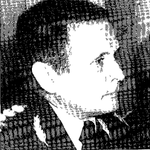
Back ميغيل إتشيكولاتز Arabic Miguel Etchecolatz German Miguel Etchecolatz Spanish Miguel Etchecolatz Basque Miguel Etchecolatz French Miguel Etchecolatz Italian Miguel Etchecolatz SIMPLE Miguel Etchecolatz Volapuk
Miguel Etchecolatz | |
|---|---|
 | |
| Born | 1 May 1929 Argentina |
| Died | 2 July 2022 (aged 93) Buenos Aires, Argentina |
| Occupation | Senior Argentine police officer |
| Criminal status | Deceased |
| Criminal charge | Homicide, torture, kidnapping |
| Penalty | Life imprisonment |
Miguel Osvaldo Etchecolatz (1 May 1929 – 2 July 2022)[1] was an Argentine police officer, who worked in the Buenos Aires Provincial Police during the first years of the military dictatorship of the 1970s, known as the National Reorganization Process (El proceso), which Etchecolatz was deeply involved in. He was first convicted of crimes committed during this period in 1986; the full stop law, which passed that year and created amnesty for security officers, meant that he was released without a sentence. In 2003, Congress repealed the law and the government re-opened prosecution of crimes committed during the Dirty War.
In 2004, Etchecolatz was one of the first two officials convicted and sentenced for child abduction: taking a child from "disappeared" parents, passing it on for adoption by officials of the regime, and hiding the child's true identity. He and Jorge Berges were each sentenced to seven years.[2] He was also deemed responsible of the "Night of the Pencils", where 10 high-school students were abducted by security forces in the city of La Plata near Buenos Aires in September 1976. Six of the 10 were "forcibly disappeared", with their fate remaining unknown. The four survivors said they were tortured.[3]
For his actions in the Provincial Police during El proceso, in 2006 he was tried, convicted and sentenced to life imprisonment, on numerous charges of homicide, illegal deprivation of freedom (kidnapping), and torture. The tribunal in passing the sentence said that Etchecolatz's crimes were "crimes against humanity in the context of the genocide that took place in Argentina".[4][5] This was the first time that the term "genocide" had been used to characterize the crimes committed against political prisoners during the Dirty War.[4][5]
The term "Dirty War" refers to the widespread state terrorism and atrocities committed under the military dictatorship of Argentina during 1976 to 1983. A military junta was established, led by General Jorge Rafael Videla, after a coup d'état against President Isabel Perón. During the military rule, tens of thousands of political dissidents were killed or "forcibly disappeared".[6]
- ^ "Murió el genocida Miguel Etchecolatz" (in Spanish). América. 2 July 2022. Retrieved 2 July 2022.
- ^ Cite error: The named reference
babywas invoked but never defined (see the help page). - ^ "Argentina Dirty War: Killer Etchecolatz gets house arrest". BBC News. 28 December 2017. Retrieved 18 September 2020.
- ^ a b Cite error: The named reference
condenaronwas invoked but never defined (see the help page). - ^ a b Klein, Naomi. The Shock Doctrine: The Rise of Disaster Capitalism. Macmillan, 2007; ISBN 0-8050-7983-1, ISBN 978-0-8050-7983-8, pp. 100–102: "The presiding member of the court, Carlos Rozanski, described the offences as part of a systematic attack intended to destroy parts of society that the victims represented and as such they constituted genocide. Rozanski noted that the International Convention on the Prevention and Punishment of the Crime of Genocide (CPPCG) does not include in its list of offences the elimination of political groups (that category was removed at the behest of Stalin), but the court based its decision on the 11 December 1946 United Nations General Assembly Resolution, unanimously adopted by member-nations, barring acts of genocide 'when racial, religious, political and other groups have been destroyed, entirely or in part', adding that the court considered the original UN definition to be more legitimate than the politically compromised CPPCG definition."
- ^ Cite error: The named reference
clarinwas invoked but never defined (see the help page).
© MMXXIII Rich X Search. We shall prevail. All rights reserved. Rich X Search